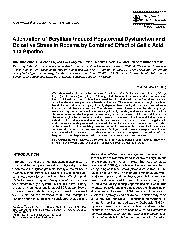摘要
We determined a minimum effective dose of gallic acid (3,4,5-trihydroxy benzoic acid; 50 mg/kg, i.p.) and piperine (10 mg/kg, p.o.) through their therapeutic potential and further evaluated them individually and in combination against beryllium-induced biochemical alterations and oxidative stress consequences in female albino rats. The administration of beryllium altered blood biochemical variables by significantly depleting hemoglobin, albumin and urea, whereas it enhanced bilirubin and creatinine. The release of serum transaminase, lactate dehydrogenase and gamma-glutamyl transpeptidase was significantly greater, and was concomitant with a decrease in serum alkaline phosphatase. A significant increase in lipid peroxidation and a decrease in glutathione, superoxide dismutase and catalase in the liver and kidney was an indication of oxidative stress due to beryllium exposure. Individual administration of gallic acid and piperine moderately reversed the altered biochemical variables, whereas the combination of these was found to completely reverse the beryllium-induced biochemical alterations and oxidative stress consequences. We concluded that gallic acid exerts a synergistic effect when administered with piperine and provides a more pronounced therapeutic potential in reducing beryllium-induced hepatorenal dysfunction and oxidative stress consequences.
